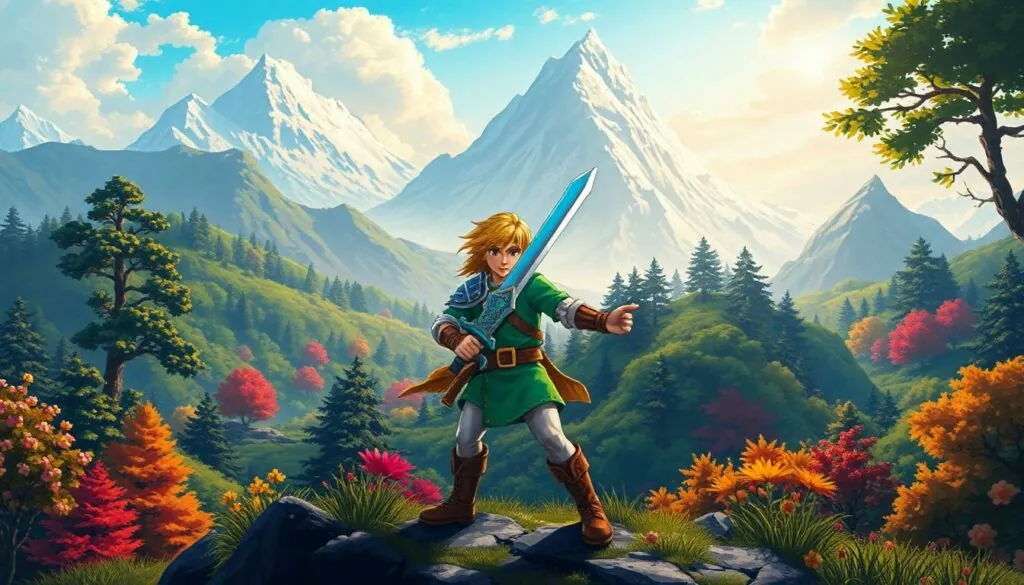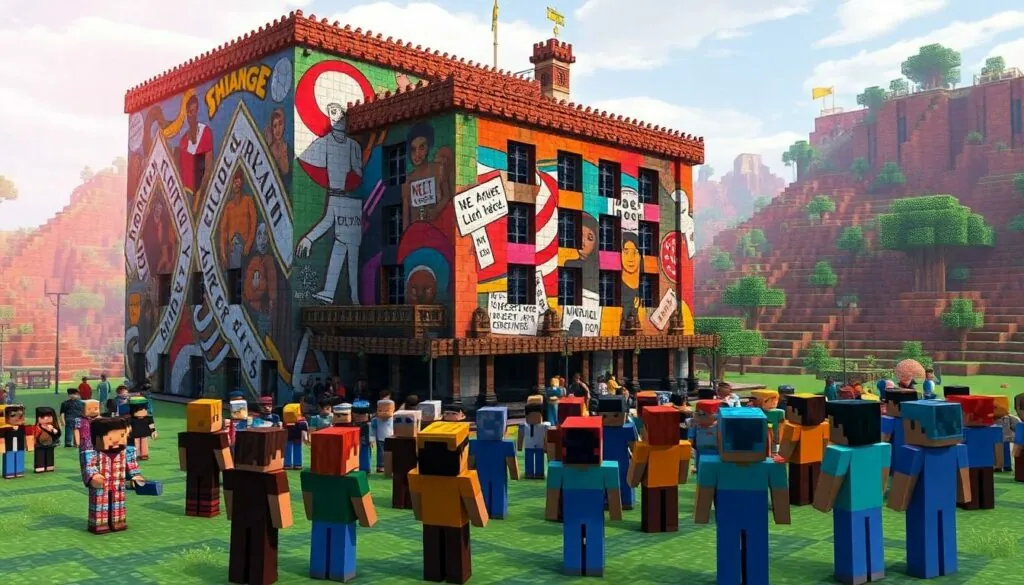In a world where reality can feel a bit too mundane, MMORPGs swoop in like a knight in shining armor, offering epic quests and fantastical realms. These massively multiplayer online role-playing games aren’t just about slaying dragons and collecting loot; they’re a vibrant tapestry of community, strategy, and sometimes, a little too much caffeine.
Imagine teaming up with friends from across the globe to conquer dungeons or trading witty banter while crafting the perfect sword. MMORPGs create a space where players can escape the ordinary and embrace the extraordinary. Whether you’re a seasoned warrior or a curious newbie, there’s a place for everyone in this digital playground. So grab your gear and prepare for an adventure that could redefine your evenings—because who needs sleep when you can save the world?
Table of Contents
ToggleOverview of MMORPGs
MMORPGs, or massively multiplayer online role-playing games, offer expansive virtual worlds where numerous players interact simultaneously. Players create unique characters, choosing from various classes and races that influence gameplay. Questing forms a core element, with experiences ranging from solo challenges to large-scale raids requiring group coordination.
Vibrant economies exist within these games, driven by in-game resources, crafting systems, and trading amongst players. Notable titles, such as “World of Warcraft” and “Final Fantasy XIV,” highlight the depth MMORPGs provide. Dynamic environments change over time, ensuring that content remains engaging and fosters player exploration.
Social interaction appears as a key feature, enabling friendships and communities to flourish. Guilds and alliances help players connect, encouraging collaboration in tackling challenging content. Events often draw players together, whether through PvP tournaments or cooperative storylines.
Game mechanics cater to diverse play styles, appealing to casual players and hardcore gamers alike. Progression systems allow for personal growth, with character levels, skill sets, and loot enhancing the gameplay experience. Frequent updates ensure fresh content, maintaining player interest over time.
Investments in graphics and sound design elevate immersion, drawing players into detailed fantasy realms. Enthusiastic developers continually strive to innovate formulas, creating unique experiences while respecting established traditions. MMORPGs thrive on their ability to blend competition and collaboration, offering immersive worlds that transform leisure time into memorable adventures.
History of MMORPGs
MMORPGs have a rich history shaped by technological advancements and player demand. This evolution highlights early innovations and significant milestones.
Early Development
Text-based games like MUD, created in 1978, laid the groundwork for the MMORPG genre. Players engaged in role-playing adventures in a virtual world defined by text commands. In the 1990s, titles like Meridian 59 and The Realm Online introduced graphical interfaces, allowing for more immersive experiences. These early games attracted players into expanded worlds, fostering online communities. During this time, the fundamental concepts of questing, leveling, and player interaction began to take shape, influencing future developments in the genre.
Major Milestones
The release of “EverQuest” in 1999 marked a major turning point for MMORPGs, showcasing 3D graphics and advanced gameplay mechanics. This title became a benchmark, attracting a large player base and setting the stage for future releases. In 2004, “World of Warcraft” redefined the genre, achieving unprecedented popularity with over 12 million subscribers at its peak. The game’s success demonstrated the potential for MMORPGs as a mainstream entertainment medium. Other noteworthy titles, like “Final Fantasy XIV,” also contributed to trends in storytelling and player engagement, further solidifying the genre’s position in gaming history.
Gameplay Mechanics
Gameplay mechanics in MMORPGs define how players interact within the game world. These mechanics range widely, ensuring variety in engagement.
Character Development
Character development involves players customizing their avatars through classes, races, and skills. Players select different traits that influence abilities and gameplay styles. Options for personalizing appearances and attributes enhance the connection to characters. Leveling up occurs through experience points gained from quests and combat. Skill trees allow players to specialize further, providing depth to the character growth process. Choices impact gameplay significantly, as characters can evolve into tanks, healers, or damage dealers. Unique builds foster diverse strategies, appealing to varied play styles.
Quest Systems
Quest systems serve as the backbone of gameplay, providing objectives that guide players through the world. Main story quests often drive the narrative forward, while side quests offer additional challenges and rewards. Players frequently encounter solo challenges or multi-player objectives that require teamwork. Daily and weekly quests create ongoing engagement and rewards for dedicated players. Additionally, dynamic and world events can change depending on player actions, enhancing immersion. Various types of quests, such as fetch, kill, and exploration missions, ensure that there is always something to pursue. The quest nature keeps players invested, making exploration and adventure an integral part of the experience.
Popular MMORPGs
MMORPGs attract millions of players globally, spurring a diverse gaming landscape. Below are two of the most well-known titles in this genre.
World of Warcraft
“World of Warcraft” stands as a pioneer in MMORPGs, launching in 2004. With over 100 million accounts created, it showcases a rich fantasy universe filled with extensive lore. Players choose unique races and classes, each affecting gameplay significantly. Raids and dungeons offer challenging content, requiring teamwork and strategy. Regular expansions introduce fresh content and increase the level cap, continually engaging the player base. The vibrant economies are driven by in-game resources, crafting, and trading. Community features, such as guilds and social events, enhance connections among players, ensuring a thriving social atmosphere.
Final Fantasy XIV
“Final Fantasy XIV” emerged in 2010, revitalized from its original release, and transformed into one of the leading MMORPGs. It emphasizes captivating storytelling, blending engaging narrative with rich character development. Players can select from varied classes and jobs, allowing for deep customization and strategic gameplay. Noteworthy expansions expand the game’s world and introduce new challenges, maintaining player interest. Events and seasonal activities create a dynamic environment, encouraging participation. Strong community support through in-game events fosters friendships, building an inclusive player environment. As a result, “Final Fantasy XIV” consistently remains one of the most popular MMORPGs available.
Future Trends in MMORPGs
Emerging advancements in technology are set to reshape MMORPGs. Enhanced graphics capabilities enable developers to create more realistic environments and character models. Players increasingly enjoy immersive experiences through virtual reality, where they can explore expansive worlds in a more engaging manner.
Artificial intelligence integration is revolutionizing NPC behavior, making interactions feel more dynamic and responsive. It’s possible for players to encounter unique character paths and challenges tailored to their gameplay style. Also, improved matchmaking systems facilitate balanced team formations for raids and competitive events.
Cross-platform functionality is gaining traction, allowing players on different systems to connect seamlessly. This feature fosters larger communities and encourages interaction between players on consoles and PCs. Moreover, the rise of mobile MMORPGs makes gaming accessible anytime and anywhere, appealing to a broader audience.
Esports is influencing MMORPG development, with competitive play becoming more prominent. Organized tournaments featuring popular titles draw significant viewership and player participation. As competitiveness increases, developers are likely to implement more structured PvP systems and rewards for skilled players.
Microtransactions are evolving, focusing on cosmetic enhancements rather than pay-to-win mechanics. Gamers tend to appreciate this shift, as it promotes fairness and prioritizes skill over purchases. In-game events and seasonal updates continue to engage the gaming community, offering fresh content that keeps players invested.
Transparency in game development cultivates trust within communities. Developers actively seek player feedback to shape updates and expansions, enhancing satisfaction and retention. As MMORPGs advance, their ability to adapt to player needs will be crucial for future success.
Conclusion
MMORPGs continue to captivate players by offering immersive experiences that blend adventure and social interaction. The genre’s evolution showcases its adaptability to technological advancements and player preferences. With vibrant communities and diverse gameplay mechanics, MMORPGs cater to a wide range of gaming styles.
As the future unfolds, innovations like virtual reality and enhanced graphics promise to elevate the MMORPG experience even further. The growing accessibility of mobile platforms and the rise of esports will likely attract new players while keeping current enthusiasts engaged. With an emphasis on player satisfaction and community building, MMORPGs are poised to thrive in the gaming landscape for years to come.






